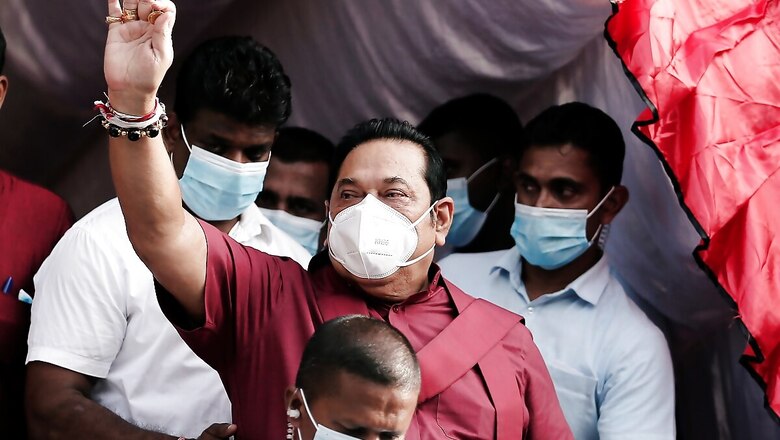
views
Sri Lankans are all set to elect their representatives to the 255-member Parliament on August 5, in what has been touted as the most expensive election in the country’s history. The election will likely mark the beginning of Rajapaksa clan’s renewed grip on the country after being in parliamentary opposition for five years.
OPPOSITION IN TATTERS
Given the bickering opposition, the major contender is the Mahinda Rajapaksa-led Sri Lanka Podujana Peramuna (SLPP), which is not only expected to win the election, but is vying for the ‘superpower’ two-third majority in Parliament.
Amid mudslinging and political bickering, the opposition in the country continues to be in tatters. The rift in the opposition isn’t something new, but came to fore in 2018 when then president Maithripala Sirisena and then prime minister Ranil Wickremesinghe launched a full-blown attack against each other in public, prompting a constitutional crisis in the country.
The crisis saw two prime ministers in the country -- Wickremesinghe and Mahinda, and was only resolved after Mahinda Rajapaksa backed down from his position. However, Rajapaksa was appointed PM by brother Gotabaya in November 2019, after Wickremesinghe quit following the drubbing in presidential polls.
Meanwhile, an internal rift within Ranil Wickremesinghe-led United National Party led to the formation of the Samagi Jana Balawegaya (SJB), headlined by Sujith Premadasa (Premadasa, however continues to be a member of UNP as of August 2).
The move is expected to deal a major blow to consolidation of Tamil votes, with both UNP and SJB eyeing their votes.
Speaking to News18, Professor of International Relations at the South Asian University Dr Sanjay K Bhardwaj termed the current scenario in Sri Lanka as ‘populism politics’.
“Within a majoritarian interface, one can’t have a parliamentary solution because the majority has the broad mandate to make laws in Parliament,” he said.
The Tamil National Alliance, the major group representing minority Tamil living in north and east Sri Lanka, also faces its biggest hurdle yet. TNA secured 16 seats in the last polls, yet the thousands of Tamilians in the country face unemployment and marginalisation.
Amid the noise and chatter of polls, the development issue seems to be conspicuously missing from the poll agenda.
GOTABAYA: THE RETURN OF THE CLAN
The key players also include President Gotabaya Rajapaksa, who won the 2019 presidential polls amid the mass rhetoric following the Easter bombings by Islamist groups.
Parliament was dissolved on April 25 this year, post which the Election Commission postponed elections twice citing Covid-19 concerns. Despite constitutional provisions warranting a maximum of three months of parliamentary recess, Gotabaya continued to rule the country with almost no oversight for almost two months.
Since taking charge, Gotabaya has taken a host of decisions to militarise the upper echelons of power and a widespread crackdown on journalists and civil society activists. From printing driving licences to creating a presidential force tasked with building a ‘secure, disciplined and virtuous society’, Gotabaya has put military officers in charge of all these policies. The shift has emboldened the majoritarian discourse in the country that has seen years of civil war and bloodshed.
THE CHINA PIVOT
Rajapaksa during his earlier tenure in 2015 adopted a favourable approach to China. This was evident during the Hambantota Port debacle, which his successor Ranil Wickremesinghe tried to renege on, claiming the “security of the port was in the country’s hands”.
The cycle appears to repeat itself. Despite apprehensions, China continues to plough in more money into the country. Nikkei Asian Review reported earlier this year that despite owing China over $4.8 billion, President Gotabaya continues to follow in his brother Mahinda’s footsteps.
The President signed onto over a billion dollars in pandemic relief loans from Beijing this year. In another instance, when asked about the SLPP’s vision for the rule, Basil Rajapaksa claimed that Chinese Communist Party was an “admirable model”.
Professor Bharadwaj says that “India will have a tightrope to walk to handle its adversaries in the region”.
Quoting maritime strategist Alfred Mahan, Bharadwaj said, “Whoever controls the Indian Ocean will dominate Asia, the destiny of the world will be decided on its waters”.
“It is in China’s interest to circumvent major choke-points to its oil transportation and Sri Lanka, theory its location, serves as a major avenue for that,” he said.
The overtures continue to be a headache for India, but despite many efforts, India continues to be on the back foot. Last month, Sri Lanka announced that it had put on review the proposed Eastern Container Terminal at the Colombo Port amid multiple protests by port workers. The project was envisaged to be jointly developed by India and Japan, but the sudden move by the Sri Lankan government has raised suspicions of China’s hand behind the decision.
AMENDMENT 19: THE THORN IN SLPP’S FLESH
The major rallying point of SLPP appears to be two-third majority in Parliament. The elusive majority will arm Rajapaksa to alter the constitutional fabric of Sri Lanka and change the direction of the country -- for good or for bad.
The Rajapaksa clan specifically aims to repeal the 19th Amendment of the Sri Lankan constitution, which limits the presidential powers relative to Parliament and Judiciary and ensure unbridled power to the clan as an extension.
Over 16 million residents have registered to vote on August 5 and will elect representatives for its 255-member assembly. Thousands of polling booths have been set up to ensure the process goes smoothly even as Covid-19 shadow continues to looms over the constitutional process.



















Comments
0 comment